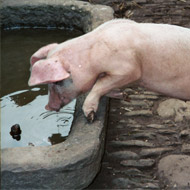Novel technique to identify foot-and-mouth disease

The method takes samples from areas that animals who are susceptible to FMD make contact with.
A novel sampling method that can detect the presence of foot-and-mouth-disease in the absence of clinical signs has been developed by The Pirbright Institute.
The method uses a simple swabbing technique to collect samples from areas that animals make contact with, such as water troughs. Researchers say the technique requires very little expertise, making it much more accessible and, during an outbreak, allows for more samples to be collected and processed.
“Current surveillance methods rely on the recognition of FMD infection in susceptible animals in addition to the collection of samples from the animals which requires veterinary expertise,” explained study leader Dr Claire Colenutt. “In keeping the approach simple, samples can be taken by individuals without prior expertise, increasing the number of potential samples, and relieving pressure on veterinary services.”
FMD virus can survive up to three months in the environment given the right conditions. Therefore, sampling areas where infected animals might have shed allows scientists to detect the presence of FMD, even if the animals are no longer displaying clinical signs.
In a press release, the Pirbright Institute said the method will allow FMD surveillance 'to go beyond the investigation of clinical signs, meaning that cases which may have been missed can be identified using environmental sampling methods'.
It also said this is equally important in areas that have FMD free status as well as those where FMD is endemic such as parts of Asia, Africa and the Middle East.
‘Novel surveillance techniques can help support a robust response to outbreaks in FMD free countries, but can also be implemented in endemic countries as part of surveillance programs to supplement current information about the spread of FMD,’ the press release said.
The study, Evaluation of environmental sampling as a low technology method for surveillance of Foot-and-mouth disease virus in an endemic area, is published in Applied and Environmental Microbiology.



 RCVS Knowledge has welcomed Professor Peter Cockcroft as editor-in-chief for Veterinary Evidence.
RCVS Knowledge has welcomed Professor Peter Cockcroft as editor-in-chief for Veterinary Evidence.